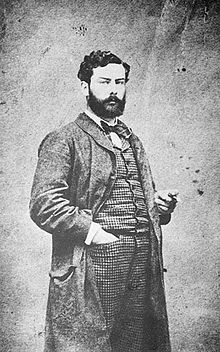Alfred Sisley | |
|---|---|
 Sisley in March 1863 | |
| Born | 30 October 1839 Paris, France |
| Died | 29 January 1899 (aged 59) Moret-sur-Loing, France |
| Nationality | British |
| Education | Marc-Charles-Gabriel Gleyre |
| Known for | Painting |
| Movement | Impressionism |
| Patron(s) | Paul Durand-Ruel, Georges Petit |
| Signature | |
 | |
This article needs additional citations for verification. (March 2024) |
Alfred Sisley (/ˈsɪsli/; French: [sislɛ]; 30 October 1839 – 29 January 1899) was an Impressionist landscape painter who was born and spent most of his life in France, but retained British citizenship. He was the most consistent of the Impressionists in his dedication to painting landscape en plein air (i.e., outdoors). He deviated into figure painting only rarely and, unlike Renoir and Pissarro, he found that Impressionism fulfilled his artistic needs.
Among his important works are a series of paintings of the River Thames, mostly around Hampton Court, executed in 1874, and landscapes depicting places in or near Moret-sur-Loing. The notable paintings of the Seine and its bridges in the former suburbs of Paris are like many of his landscapes, characterised by tranquillity, in pale shades of green, pink, purple, dusty blue and cream. Over the years Sisley's power of expression and colour intensity increased.[1]
- ^ Richard Shone: Sisley. London: Phaidon Press 1999. ISBN 0-7148-3892-6